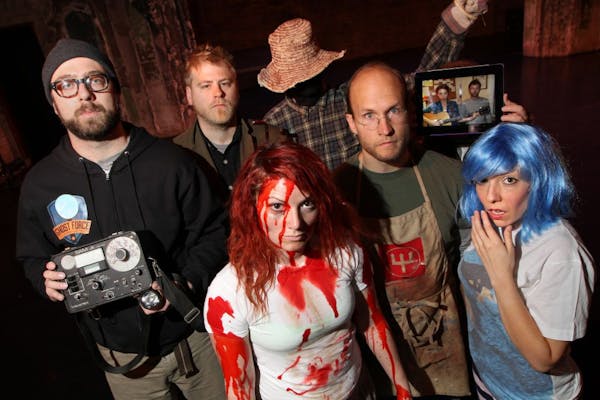Divorce, free love, cohabitation and fierce individualism put marriage in the cross hairs in 1970, when composer Stephen Sondheim and writer George Furth cobbled together the musical comedy "Company." The show revolved around Bobby, a laconic gent celebrating his 35th birthday in the company of married friends and his three girlfriends.
Sondheim freighted the enigmatic Bobby with an entire society's insecurities about marriage: Could it survive in its traditional form; was its traditional form even the tradition; was it threatened by changing mores and attitudes; did it require reinvention?
"A person is not complete until he is married," says one of Bobby's friends -- repeating a bromide that typified mainstream views of how one succeeded in society up until even the late 1960s.
Marriage has become one of the topics du jour in this election season, so artistic director Peter Rothstein thought it might make sense to revisit "Company" for Theater Latté Da. The production, starring Dieter Bierbrauer as Bobby, opens Saturday at the Ordway Center's McKnight Theatre. The cast also includes Jody Briskey, who will sing the Elaine Stritch classic "The Ladies Who Lunch," David Darrow from last season's "Spring Awakening" and Andrea San Miguel, who just played the title role in Walking Shadow's "Eurydice."
"Company" started as a series of 11 disparate one-acts, stitched together by Bobby's story thread. It is not linear or plot-driven. Instead, each scene comments on the state of wedded bliss/hell and Bobby's bachelorhood. It was nominated for 14 Tonys and won six back in 1970.
That success has rarely translated into box-office catnip -- a point not lost on Rothstein -- but the inquiry into Bobby's psyche, along with Sondheim's music, made it worth the trouble for the director.
"They [Sondheim and Furth] were asking, 'How do people maintain intimate relationships in a society that is becoming depersonalized?'" Rothstein said.
To bring this idea into 2012, he has his cast on cellphones, surfing the Internet, hooking up on match.com and otherwise finding new ways to connect through technology.
"I read that there are studies showing the iPad is used in the bedroom more than anyplace else," Rothstein said, amused by the irony that in the most intimate room of the house, people have chosen an electronic mate.
"Company" resists easy choices. Bobby, in particular, never reveals himself fully. Rothstein said during an interview that he was planning to spend the next day with Bierbrauer, going through the script and asking in each scene, "What is Bobby learning here?" The challenge is to get out of Bobby's head and show the action on the stage without being too literal.
The show's relevance is not necessarily right on the nose. But marriage is certainly in the air. In Minnesota, voters will decide on a constitutional amendment banning same-sex marriage and civil unions. "Company" is less a look at the politics of marriage and more an exploration of its relative sturdiness -- whether for same-sex or opposite-sex couples.
"With what's happening with the heightened focus on marriage right now, it feels less dated," Rothstein said. "We really wanted to update it."
Hard sell
"Company" has a sketchy history in the Twin Cities. It lasted only two months at Chanhassen Dinner Theatre in 1977. Theatre in the Round had a production in 1994 and Bloomington Civic Theatre mounted the show in 2004. Asked whether he felt his production would sell, Rothstein asked, "Does any Sondheim sell, other than 'Into the Woods?'"
"Once you leave New York, Sondheim is always a tough sell," he said, noting that the acclaimed production of "A Little Night Music" did not go on national tour after its successful Broadway run. "Company" finds Sondheim in excellent voice and the show breaks norms, but the question for any production is whether audiences can identify with Bobby's early-life crisis (although in 1970, 35 was a lot older).
"It's really a hard show," Rothstein said. Some of the demands stump him, he admitted, but he's determined to come up with answers because he's convinced there is something there.
"They were radically breaking the form open," he said. "When the show does something you don't expect it to do, you have to assume Sondheim had to have a reason."
Graydon Royce • 612-673-7299
In heated western Minn. GOP congressional primary, outsiders challenging incumbent

Minnesota Sports Hall of Fame: A class-by-class list of all members

This retired journalist changed professional wrestling from Mankato

